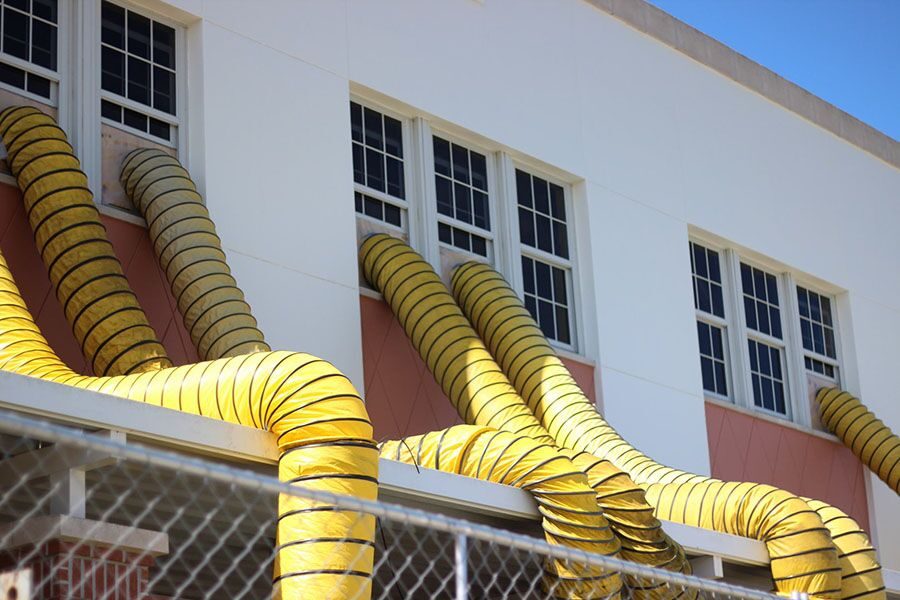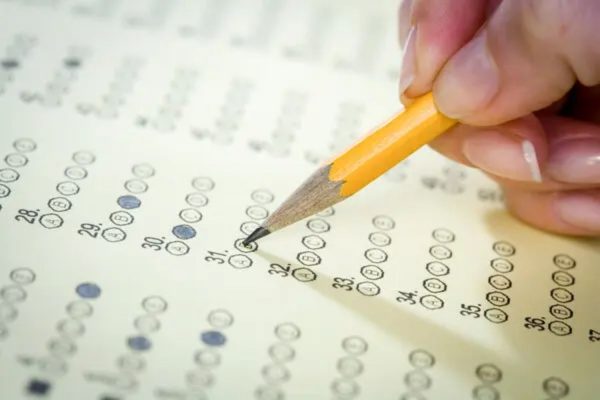District addresses school facility issues
Mold cleaned in auditorium, with air conditioner repairs underway
There have been some recent issues with the air conditioning in the gymnasium and the rest of the school. The administrators and district personnel worked over the summer to prepare the school facilities for students.
Mold was found in the auditorium by theater instructor Dan Franke Monday, July 9 and has now since been removed.
Given the older age of the school air conditioning and their frequent use against Florida’s heat, air conditioning issues are not new to staff and students. The mold was caused by an air conditioner that was down, causing the humidity level to not be regulated.
“It was very warm in my office and smelled terrible,” Franke said. “That’s when I saw that there was mold on a lot of the surfaces in my office. It was on my desk and on the bookshelves and still on some stuff out here in the auditorium, [like] on the stage.”
Safety crews came to clean the mold reported by Franke three times before deeming it safe to reopen the auditorium to Franke and his students Tuesday, Aug. 14. The district covered the cost of inspection and cleanup.
“The crews were very responsive,” assistant principal Lauren Otero, who oversees campus facilities, said. “They came out here right away and did a thorough inspection to make sure [the mold] wasn’t anywhere else but just wasn’t visible. It has been eliminated and there isn’t a jeopardy of being unsafe or anything like that.”
As for shows, Franke hopes to proceed with his original schedule for “Chicago,” running from Nov. 1-3. However, Franke was informed of separate safety issues in the auditorium the district must repair involving the storage area for costumes and props, the loft lighting areas and the attic of the auditorium.
“It’s a little bit of a dismal outlook until we hear from administration what the next steps will be,” Franke said. “Without being able to hang and focus our lights, without being able to change the colors in the gels, without being able to get to our costumes, without being able to get to our props, without being able to get to our scenery and tools, we can’t do anything except … rehearse, but that’s it. So, until we get access to those things back, we’re kind of in a tough position.”
Currently, the district is planning to contract out a group to help move items from these areas to check for damages so the spaces can be repaired.
“It’s kind of a rough situation,” Franke said. “We’re really stumbling out of the gates; it’s been very difficult to get momentum. Personally, as a teacher, I have been displaced from my classroom for the entirety of pre-planning and … for the first two days of school. It’s confusing for the students, [and] it’s frustrating for teachers all over the building who use this space.”
Other teachers are also facing classroom difficulties as some rooms have no air conditioning. Although there isn’t an exact number of how many classrooms are out currently, Otero estimates that less than 15 percent of the school is without air.
Economics teacher Katherine Bohan has been without air conditioning since open house.
“The first couple of days it was pretty uncomfortable,” senior Ben Davis, who is a student of Bohan’s, said. “We were all sweating and we had to leave our door open for a breeze, but it was manageable. Now we’re in a different class for the time being.”
JROTC teacher Colonel Calvin Mason has also been experiencing issues with air since planning week. In order to make it more tolerable for students, Mason moved his classes to a computer testing room.
“You have a preference [when it comes to teaching with or without air conditioning],” Mason said. “I think it’s all relative. What I tell people is that it’s better than Afghanistan, so I try to keep that perspective, but it’s certainly not ideal. For me, since I have to be kind of focused on what I’m saying, I can tell I really don’t have all the engagement from the students because — especially when this classroom is full — it’s miserable in here … I feel for the students. The engagement for them is difficult, especially when you’re sitting close to someone … it’s hard for them.”
Junior Walker Phillips is a part of Mason’s homeroom, where they couldn’t be moved to a different building.
“It definitely wasn’t the best walking to my first period already sweating,” Phillips said. “The fans, although helping, just seemed to push the hot air around the classroom.”
Senior Victoria Navedo is a part of JROTC and just moved from New York.
“[Not having air conditioning] doesn’t bother me,” Naveda said. “I came from a school with no air conditioning; the school had no air conditioning at all, except in the computer room.”
AP Environmental Science teacher Margaret Drumsta’s air conditioning has been affected by fire alarms being tripped. When fire alarms are triggered, it shuts down air conditioning vents to prevent smoke and fire spreading inside the school.
“[The air conditioning] is hit or miss.” Drumsta said. “When I came in this morning, I think something had tripped [the fire alarm], so I think [the air conditioning] is not as perfect as it should be; it’s stagnant. The office is aware; they’re doing everything they can on the office level. They know about it, they feel for us … I think [having no air conditioning] affects everybody. I get hot, I get tired, especially being pregnant. It takes a lot of energy to talk … and you don’t really want to do anything. The kids are lethargic, they’re sweating. It’s very difficult to teach when it’s hot.”
Along with classrooms, the gym also has been experiencing air conditioning issues, affecting the volleyball team.
“We had to cut down how long practices were,” freshman Abby Larkin, who is on the JV volleyball team, said. “Also the air conditioning was down during tryouts, so we had to make it two days instead of three and two hours instead of three. We had to take 10-minute breaks every once in a while in the hallway, too, so it cut it down even more.”
As of right now, the gym has temporary air conditioning units.
“During tryouts it was awful especially because of the new flooring,” sophomore Zoe Zink, also on the JV volleyball team, said. “Everyone was slipping on sweat. There’s a temporary air conditioning unit now, but it feels like it normally would. It didn’t affect our team too much since it was dealt with quickly.”













